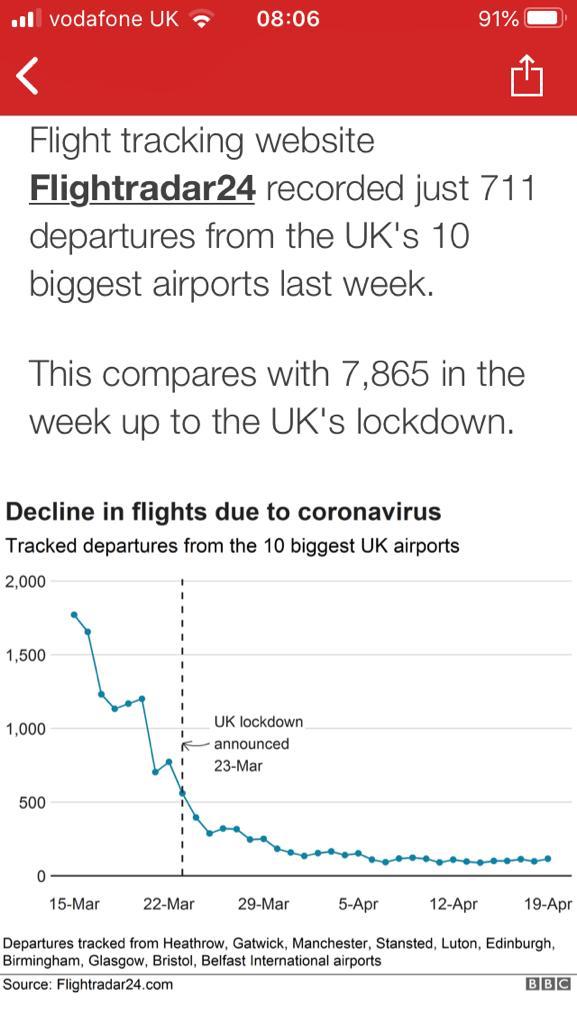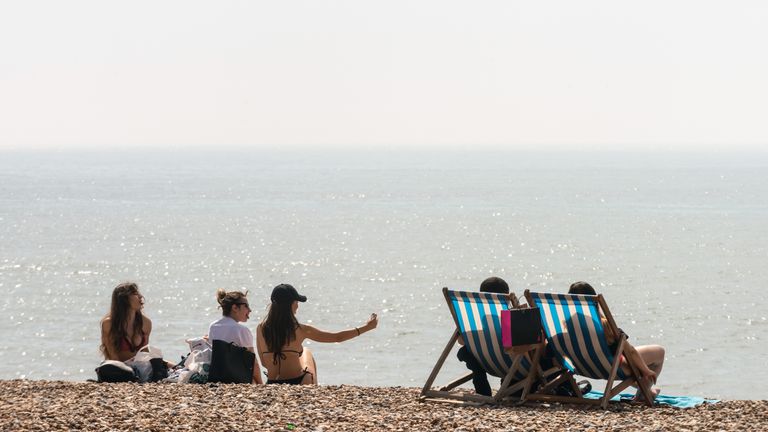Updated on 2020-04-25 by Adam Hardy
The last time so few planes were in the air was in the 3 days following the 9/11 attacks. Air traffic over London now is non-existent, with lockdown to combat the spread of the corona virus keeping us at home.

As well as clear skies without a contrail in sight, there’s also lots less noise pollution, air quality has shot up and the price of oil has fallen through the floor. Literally you have to pay people to take the oil. Part of the problem when you’re pumping oil out of the ground is that you can’t just turn off the tap – that would ruin the oil well and perhaps the oil reservoir itself – so the oil companies must keep on pumping and now have nowhere left to store the stuff.

Without trying to ignore the misery and suffering from all of this, there are 2 obvious comments I’d make about the effects of this massive, abrupt economic slow-down.
First, daily global CO2 emissions are down by 30 to 40% and for the whole year it could be the first annual decrease ever. As a stand-alone number, that is phenomenal but it goes hand-in-hand with the other economic data about job losses, GDP, flight numbers, road traffic and oil consumption – the statistics of disaster.

If you are a sworn tree hugger, you might figure that’s loads of CO2 that hasn’t gone into the atmosphere. The news is full of theories of what this all represents for the future – and everybody with an axe to grind will certainly have worked out what it means for the future they want.
There are some serious lessons that should be and could be learned from the corona virus pandemic, but whether they get learned or not isn’t something I can predict.
Lockdown is Half-time
In terms of climate change, I see this as only a half-time break in the game of CO2 vs Mankind. Once the break is over, the competition is probably going to be just as intense as ever. It’s not going to make much difference except delay sea level rise by a few months.
Secondly though, our streets are quiet – there are no traffic jams on the A1 out of London, there are no air pollution warnings via SMS, there’s no constant hum of traffic through the day. This will have a lasting effect.
While some businesses like entertainment are being pummelled, many people are adjusting quite well to working from home and even getting used to it and finding different ways to stay productive.
While trying to find a great article to link to here, I was amazed by the vast number of hits by searching on “adapting to lock-down”. There are millions! I chose this one, from our veggie box farm Riverford.

One major take-away from all of this is that actually, we used to do a whole load of stuff we didn’t really need to, and now we’ve stopped, it won’t make much sense to start again.
As the lockdown continues, it will become obvious where, when and why real face-to-face meetings are irreplaceable – in situations where we really need high quality personal communication with all the body language and vocal communication (without the hissing, drop-outs and lag!), especially getting to know each other – being human.
Many of the things that we just did from force of habit will now just fall away, and the resources we put into them – such as travelling – can be redirected. So while it comes at a dire price, this new lens that we are looking at life through is one silver lining we can take away from all this.


4 replies on “Clear Blue Skies in Lockdown”
More: European cities bet on pedal power after lockdown – https://www.politico.eu/article/helped-on-by-the-coronavirus-covid19-brussels-battles-its-car-culture/
More stuff: Telecommuting Could Outlive the Pandemic, Lowering Emissions – https://www.scientificamerican.com/article/telecommuting-could-outlive-the-pandemic-lowering-emissions/
[…] and industry go on without any intervention or carbon policy (ignoring COVID-19 for a moment or see here), then we are heading to a 3 to 4°C future: “A 3°C World Is Now ‘Business as […]
A lot of people think CO2 emissions should have fallen even further
judging by the economic carnage – https://www.scientificamerican.com/article/why-co2-isnt-falling-more-during-a-global-lockdown/